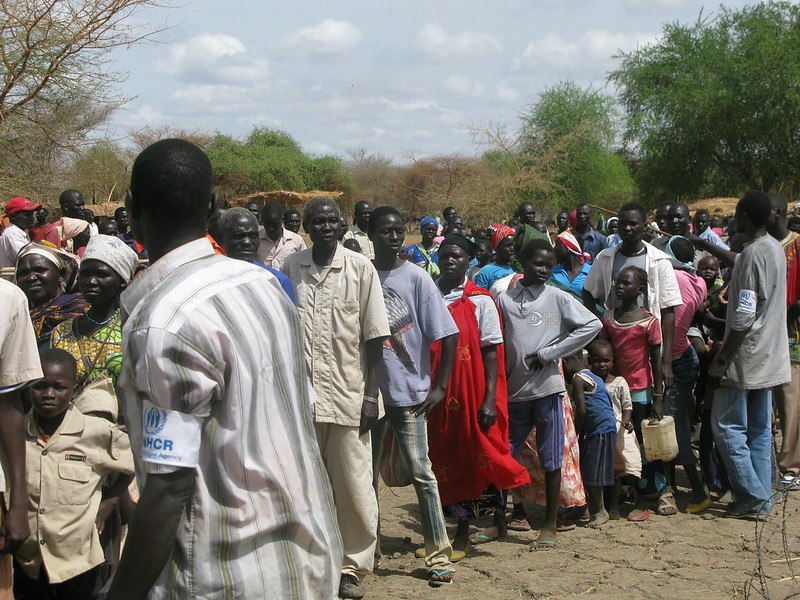Refugee-Led Innovation Fund: UNHCR Empowering Communities
 UNHCR has launched a groundbreaking initiative to empower refugees and displaced persons: the Refugee-Led Innovation Fund. The fund offers financial support, mentorship and technical expertise to organizations whose leaders are individuals with firsthand experience of forced displacement. Fostering innovation and community leadership plays a crucial role in combating poverty and building resilient communities.
UNHCR has launched a groundbreaking initiative to empower refugees and displaced persons: the Refugee-Led Innovation Fund. The fund offers financial support, mentorship and technical expertise to organizations whose leaders are individuals with firsthand experience of forced displacement. Fostering innovation and community leadership plays a crucial role in combating poverty and building resilient communities.
At its core, the Refugee-Led Innovation Fund is a recognition of the untapped potential within refugee populations. It challenges the traditional humanitarian aid model and places refugees at the forefront of problem-solving. The fund provides a platform for individuals to identify pressing community needs. Furthermore, it encourages the development of innovative solutions that directly address their challenges.
Refugee-Led Innovation Fund
One of the primary objectives of this fund is to empower refugee communities. These communities often face significant challenges in accessing resources and funding, which can limit their ability to create lasting positive change. This fund provides up to $45,000 in financial support, along with mentorship, technical expertise, and networking opportunities.
This fund is unique in its approach. It prioritizes organizations led by people with lived experience of forced displacement, including refugees, asylum-seekers, internally displaced persons and stateless individuals, according to FundsForNGOs. The fund focuses on those who have firsthand experience of these challenges, to ensure that solutions are driven from the people who understand the needs of their communities best.
The fund places a special emphasis on supporting underrepresented groups, women, people with disabilities, and Indigenous populations. These groups often face additional layers of marginalization, making it even more difficult for them to access traditional forms of funding and support. The UNHCR’s Refugee-Led Innovation Fund not only provides financial resources but also helps these groups build their organizational capacity, ensuring that their voices are heard and their initiatives can thrive.
Application Process and Criteria
The application process for the fund is designed to be accessible and supportive. It involves two stages: an initial expression of interest, followed by a full proposal for shortlisted organizations. The criteria for assessment include innovation, impact, engagement, and the feasibility of implementation.
This process ensures that only the most promising and impactful projects receive funding, while also providing support to applicants throughout the process. This helps to level the playing field, allowing smaller or less established organizations to compete on equal footing with larger, more established ones.
These four organizations from 2024 are prime examples of how community-driven innovation drives meaningful change in the fight against poverty
Bridging Gaps and Afri-Youth Network – Uganda
In Uganda’s Bidibidi Refugee Settlement, a lack of access to financial markets, entrepreneurship education and banking systems hinders refugees from starting social enterprises and becoming self-sufficient. This perpetuates cycles of poverty and inequality. The Bridging Gaps and Afri-Youth Network addresses this challenge by providing entrepreneurship training, micro-loans and long-term coaching. Its work focuses on increasing female participation, empowering up to 60 refugee entrepreneurs to break free from poverty and create sustainable income sources for their communities, according to UNHCR.
Fundación MUEVE – Ecuador
Ecuador has seen an influx of Venezuelan refugees and migrants, leading to elevated levels of unemployment and economic marginalization. Fundación MUEVE is establishing a creative and digital hub focused on technological training and innovation to address these challenges. The hub will offer training in digital skills, such as 3D printing and scanning and foster a collaborative ecosystem to promote socioeconomic integration and social cohesion, according to UNHCR. Reaching more than 500 individuals, the project aims to reduce unemployment and promote economic and social inclusion through digital innovation.
Let’s Read – Jordan
In Jordan’s Zaatari Refugee Camp, educational barriers, including unreliable internet connectivity and a lack of digital resources, negatively impact refugee children’s learning and development. According to UNHCR, girls are disproportionately affected. Let’s Read is working to bridge this gap by providing easy access to learning through both technological and offline solutions. The project will create and distribute educational content via WhatsApp. Additionally, it offers personalized learning experiences through AI-based platforms, and develops offline learning resources, UNICEF reports. The project will enhance educational outcomes and boost digital literacy. It will create a resilient learning ecosystem that empowers refugees, especially girls and women, to thrive despite challenges.
Kalobeiyei Initiative 4 Better Life – Kenya
Kenya is facing a severe food crisis due to prolonged drought, affecting millions and leading to increased malnutrition rates, particularly among children and pregnant women, UNHCR reports. The Kalobeiyei Initiative 4 Better Life is addressing these food security and nutrition challenges in the Kakuma refugee community. The program is cultivating nutrient-rich sprouts in recycled plastic containers. This innovative approach not only improves food security and well-being but also provides skill-building opportunities for up to 200 individuals from both refugee and host communities, according to UNICEF. This project is helping to mitigate the impact of the food crisis on vulnerable populations through community cooperation and resilience.
Refugee-Led Innovation Fund: The Potential
The UNHCR’s Refugee-Led Innovation Fund is a transformative initiative that is redefining the role of refugees in humanitarian response. The fund is providing the necessary resources and support to unlock the potential of refugee-led organizations to drive innovation, create sustainable livelihoods and build resilient communities.
– Sumaiya Sultana
Sumaiya is based in London, UK and focuses on Business and Good News for The Borgen Project.
Photo: Flickr
